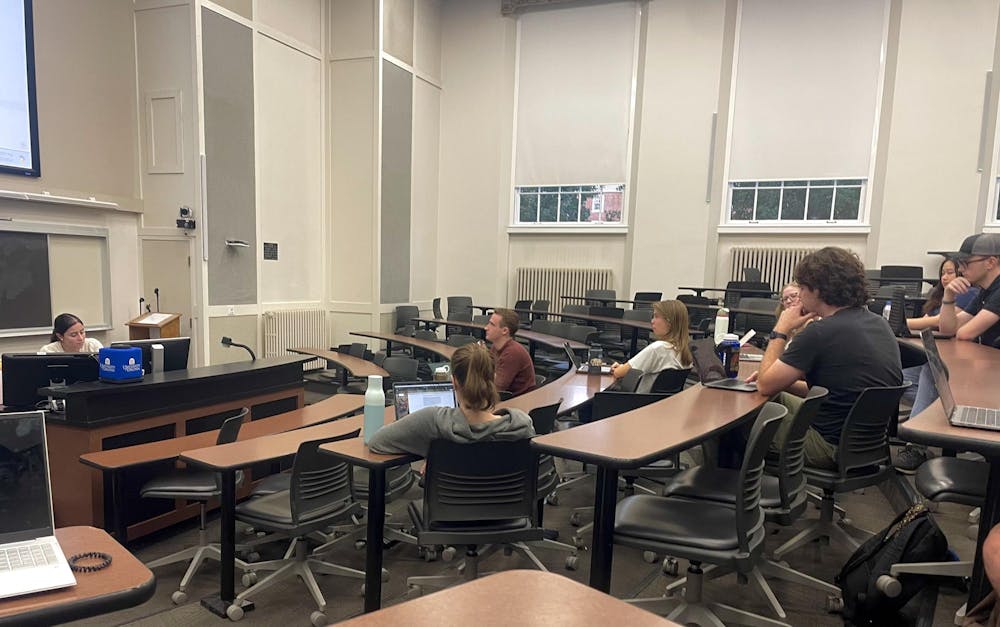The Honor Committee met Sunday to review faculty and graduate student outreach plans proposed by the Faculty Advisory Committee, one of the Committee’s seven standing subcommittees. The Committee plans to host events and focus groups to better understand faculty relationships with the Honor system, as well as increase engagement with faculty and graduate student teaching assistants. Additionally, the Committee plans to introduce “voting days” to allocate specific public sessions for voting on bylaws, ensuring that quorum is met.
Last semester, the Committee discussed how subcommittees could gauge community perspectives on the multi-sanction system, which the Committee transitioned to July 2023. The new multi-sanction system broadened the range of sanctions for accused students to include more restorative measures, such as rehabilitation seminars. Faculty members were one of the groups from whom the Committee plans to gather feedback, due to their roles in identifying and reporting honor violations.
The FAC also serves to gather feedback from faculty on the Committee's system and practices, and will host events such as an “AI Lunch & Learn” session to facilitate a discussion between professors and students on navigating AI. According to Simran Havaldar, chair of the FAC and fourth-year Commerce Rep., the “AI Lunch & Learn” event would include a student and professor Q&A session on using AI in academic settings at the University.
Havaldar said the event will involve professors from a host of schools — the McIntire School of Commerce, the Frank Batten School of Leadership and Public Policy, the School of Data Science, and the School of Engineering — meeting to discuss AI’s use across different domains.
The FAC will also address other concerns that faculty members might have through focus group meetings. These small groups, consisting of faculty members and Honor representatives, will discuss topics including the reluctance of faculty members and graduate student teaching assistants to report offenses.
Hang Nguyen, graduate College Rep., said that she previously worked as a graduate TA and observed that TAs were unaware of what types of evidence were necessary for filing a report , which might discourage them from reporting issues.
“There was a lot of confusion amongst the TAs that I worked with about what evidence they needed [for a report],” Nguyen said.
Will Hancock, vice chair for the undergraduate community and third-year College student, said that investigators — support officers tasked with compiling evidence before an honor trial — should help faculty and graduate student reporters navigate the case process, citing AI use as an area Honor investigators are well-equipped to help reporters handle.
“Investigators are experienced … particularly around AI [offenses],” Hancock said. “Offloading that stress to make sure that that burden is on investigators is really important.”
The Committee shifted to a discussion on “voting days,” which are days where the Committee would be scheduled to vote on changes or additions to bylaws. At present, votes for bylaw changes can happen at any meeting. For the Committee to vote on changes, they must meet quorum, meaning 20 of the 30 representatives must be present. Laura Howard, chair of the Committee and fourth-year College student, introduced the idea and said that a voting day schedule would ensure that the Committee consistently meets quorum for voting.
Ben Makarechian, fourth-year Batten Rep., said that publicizing the voting days could also allow more students to observe and stay informed about bylaw changes.
“If [students] were to show up [for voting], it would be on days to see how the bylaws changed,” Makarechian said. “It might foster some interest.”
Howard announced that voting days are tentatively scheduled for Oct. 20, Dec. 1, Jan. 26, and Mar. 2, but are subject to change as Committee members share their schedules. The Committee will reconvene Sep. 22 at 7 p.m. in the trial room of Newcomb Hall.







